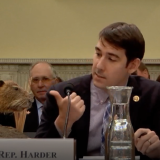Water
Image
Water is the lifeblood of the Valley. And yet politicians are trying to build the Delta Tunnel to ship our water down south. The lawns in Beverly Hills don’t need that water, our Valley farms and economy do. It’s a water grab that would crush our community. .
We have to stop the Delta Tunnel and instead invest in water infrastructure so our Valley communities can continue to thrive. .
My Plan:
- Stop the Delta Tunnel: Water is our most precious resource, we have to protect it.
- Boost Storage: Increase our water storage to save for dry years.
- Spark Innovation: Invest in new technologies to improve our water systems.
- Update Infrastructure: Fix our outdated water infrastructure.
For more information concerning work and views related to Water, please contact our office.

